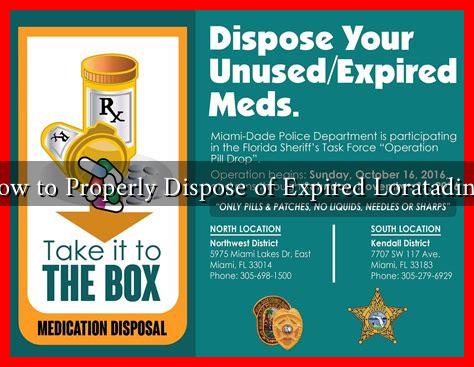-
Table of Contents
- How to Properly Dispose of Expired Loratadine?
- Understanding Loratadine and Its Expiration
- Why Proper Disposal Matters
- Steps for Proper Disposal of Expired Loratadine
- 1. Check Local Regulations
- 2. Utilize Drug Take-Back Programs
- 3. Dispose of in Household Trash (If Necessary)
- 4. Do Not Flush
- Conclusion
How to Properly Dispose of Expired Loratadine?
Loratadine, an antihistamine commonly used to relieve allergy symptoms, is a staple in many households. However, like all medications, it has an expiration date. Disposing of expired loratadine properly is crucial for both safety and environmental reasons. This article will guide you through the best practices for disposing of expired loratadine, ensuring that you do so responsibly.
Understanding Loratadine and Its Expiration
Loratadine is an over-the-counter medication used to treat allergies, hay fever, and hives. It works by blocking the action of histamine, a substance in the body that causes allergic symptoms. While loratadine is generally safe, its effectiveness can diminish after the expiration date, which is typically printed on the packaging.
Using expired medications can lead to ineffective treatment and potential health risks. According to a study published in the Journal of Pharmaceutical Sciences, many medications can lose potency over time, which can be particularly concerning for those relying on them for chronic conditions.
Why Proper Disposal Matters
Improper disposal of medications can lead to several issues:
- Environmental Impact: Flushing medications down the toilet or pouring them down the drain can contaminate water supplies and harm aquatic life.
- Accidental Ingestion: Discarded medications can be found by children or pets, leading to accidental poisoning.
- Drug Abuse: Unused medications can be misused or abused if not disposed of properly.
Steps for Proper Disposal of Expired Loratadine
Here are the recommended steps for disposing of expired loratadine safely:
1. Check Local Regulations
Before disposing of any medication, check your local regulations regarding pharmaceutical disposal. Many communities have specific guidelines for disposing of medications safely.
2. Utilize Drug Take-Back Programs
One of the safest ways to dispose of expired loratadine is through drug take-back programs. These programs are often organized by local pharmacies, hospitals, or community organizations. They provide a safe and environmentally friendly way to dispose of unused medications.
- Find a Take-Back Location: Use the DEA’s website to locate a take-back site near you.
- Participate in National Drug Take-Back Days: These events are held biannually and encourage the public to dispose of unused medications safely.
3. Dispose of in Household Trash (If Necessary)
If a take-back program is not available, you can dispose of loratadine in your household trash by following these steps:
- Mix with Unpalatable Substances: Combine the loratadine with an undesirable substance, such as dirt, cat litter, or used coffee grounds.
- Seal in a Container: Place the mixture in a sealed plastic bag or container to prevent leakage.
- Throw Away: Dispose of the container in your household trash.
- Remove Personal Information: Before discarding the original packaging, ensure that you remove any personal information to protect your privacy.
4. Do Not Flush
Flushing loratadine down the toilet is not recommended unless the label or patient information specifically instructs you to do so. Flushing can lead to water contamination and harm aquatic ecosystems.
Conclusion
Proper disposal of expired loratadine is essential for safety and environmental protection. By following local regulations, utilizing drug take-back programs, and disposing of medications responsibly, you can help prevent accidental ingestion and environmental contamination. Remember, when in doubt, consult your pharmacist or local waste management authorities for guidance on safe disposal practices.
In summary, always check the expiration date on your medications, and when it’s time to dispose of them, do so thoughtfully and responsibly. Your actions can make a significant difference in promoting public health and protecting our environment.


